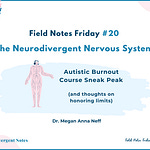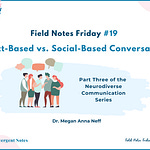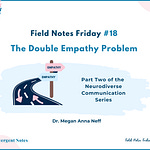Support Links
If you found value in this conversation and are in a space to comfortably give, can you do me a favor and buy my new friend Kali a coffee? 🖤 👉🏻 Buy Kali a Coffee ☕️
This is a good week to support the Black and Brown Autistic creators in our community who do so much underappreciated labor. 🙏🏽✨
Instead of asking them questions or relying on free labor, what if we asked — how can I support you this week?
And if you’re looking for another way to show support this week, please consider contributing to the family of Victor Perez:
https://www.gofundme.com/f/justice-for-victor-perez
In moments of crisis, calling the police can escalate rather than de-escalate—especially for Black and Brown Autistic individuals.
Don't Call the Police is a directory of community-based alternatives. It’s a resource we all need to have bookmarked.
About This Series ~ Field Notes Friday (Special Series)
Field Notes Friday is usually for paid subscribers only because, well, video makes me anxious. My obsessive tendencies spiral around getting things just right — and I feel safer knowing fewer people are watching if I flub a stat, have a dyslexic moment, or use a phrase that isn’t aligned with my values.
But this month, I’m pushing through those fears because this work matters. It matters more than the voice in my head whispering, 💭 “What if you got that one study wrong?”
So I’m making this series free to all subscribers, paid or not. If you’re subscribed, I hope you’ll join me. I think these conversations are worth having — messiness, nuance, and all.
Warmly,
Megan Anna
Conversation Entry Points
Conversation Entry Points
(P.S. Comments on Substack posts are currently reserved for paid subscribers — and, unfortunately, that boundary has become even more important with some of the reactions I’ve been getting to the Autism Epidemic article 🤦🏻♀️. I’ve found that keeping conversations in smaller, quieter spaces helps me stay engaged and present without spiraling into overwhelm or avoidance. I love being in dialogue here and in the Nook — and I’m learning to honor my limits so I can keep showing up in sustainable ways. I know this won’t work for everyone, and I’m truly grateful for your presence in whatever form it takes.)
This week’s conversation with Kali touched so many layered truths — about diagnostic inequity, hermeneutical injustice, and how race and ableism intersect in both overt and subtle ways. If you’d like to reflect along with us, here are a few prompts:
✨ When did you first begin to notice that conversations in the autism advocacy space weren’t including everyone? In what conversations do you see we’re still doing this (for example, in the conversation even the idea of telling our children they are Autistic is not as clear as I’ve always considered it).
✨ If you’re a BIPOC Autistic person, how have race and culture shaped your experience of being diagnosed — or not diagnosed? What have you had to explain, hide, or fight for?
✨ If you’re white what has or is helping you to do the work? How are you sidestepping the pitfalls of guilt or shame and practicing self-compassion so that you can better show up for others?
✨ How do you relate to the idea of hermeneutical injustice — that there may have been parts of your experience that you couldn’t name because no language was available to you? What shifted when you have found the words that help you capture a complex experience?
✨ When do you feel most seen in ND spaces — and when do you feel most invisible?
Corrections:
I haven’t slept well this week, so there were a few ADHD and dyslexia errors, probably many 🙃 But here is a very obvious one 👇🏻
Minute 41: I say “given an AI device” meant to say — given an AAC device
Social Media Posts Links (These are posts Kali shared)
Other Resources Mentioned
The conversation with
on Divergent Conversations was referenced.References
Aylward, B. S., Gal-Szabo, D. E., & Taraman, S. (2021). Racial, Ethnic, and Sociodemographic Disparities in Diagnosis of Children with Autism Spectrum Disorder. Journal of developmental and behavioral pediatrics : JDBP, 42(8), 682–689. https://doi.org/10.1097/DBP.0000000000000996
Ballentine, K. L. (2019). Understanding racial differences in diagnosing ODD versus ADHD using critical race theory. Families in Society, 100(3), 282–292. https://doi.org/10.1177/1044389419842765
Constantino, J. N., Abbacchi, A. M., Saulnier, C., et al. (2020). Timing of the diagnosis of autism in African American children. Pediatrics, 146(e20193629). https://doi.org/10.1542/peds.2019-3629
Durkin, M. S., Maenner, M. J., Baio, J., et al. (2017). Autism spectrum disorder among US children (2002–2010): Socioeconomic, racial, and ethnic disparities. American Journal of Public Health, 107(11), 1818–1826. https://doi.org/10.2105/AJPH.2017.304032
Mandell, D. S., Ittenbach, R. F., Levy, S. E., et al. (2007). Disparities in diagnoses received prior to a diagnosis of autism spectrum disorder. Journal of Autism and Developmental Disorders, 37, 1795–1802. https://doi.org/10.1007/s10803-006-0314-6
Wiggins, L. D., Durkin, M., Esler, A., Lee, L. C., Zahorodny, W., Rice, C., Yeargin-Allsopp, M., Dowling, N. F., Hall-Lande, J., Morrier, M. J., Christensen, D., Shenouda, J., & Baio, J. (2020). Disparities in Documented Diagnoses of Autism Spectrum Disorder Based on Demographic, Individual, and Service Factors. Autism research : official journal of the International Society for Autism Research, 13(3), 464–473. https://doi.org/10.1002/aur.2255














Share this post